Human Resource Management Report - BTEC Higher Nationals
VerifiedAdded on 2023/01/19
|11
|3998
|29
Report
AI Summary
This report provides a comprehensive overview of Human Resource Management (HRM). It begins with an introduction to HRM, discussing its purpose, scope, and key activities such as hiring, selection, and employee relations. The report then delves into the core functions of HRM, including workforce planning, performance management, training and development, and compensation and benefits. It explores the differences between hard and soft HRM approaches and the influence of internal and external factors on HRM practices, including political, economic, social, technological, environmental, and legal factors. The report also examines recruitment processes, job analysis, selection procedures, and the importance of onboarding and induction. Furthermore, it highlights the benefits of effective HRM practices for both employers and employees, focusing on employee relations, profit and productivity, and various HRM methods such as reward management and flexible organization. The report concludes with an evaluation of HRM practices and their impact on organizational success. The context of Tesco is used to illustrate these concepts.
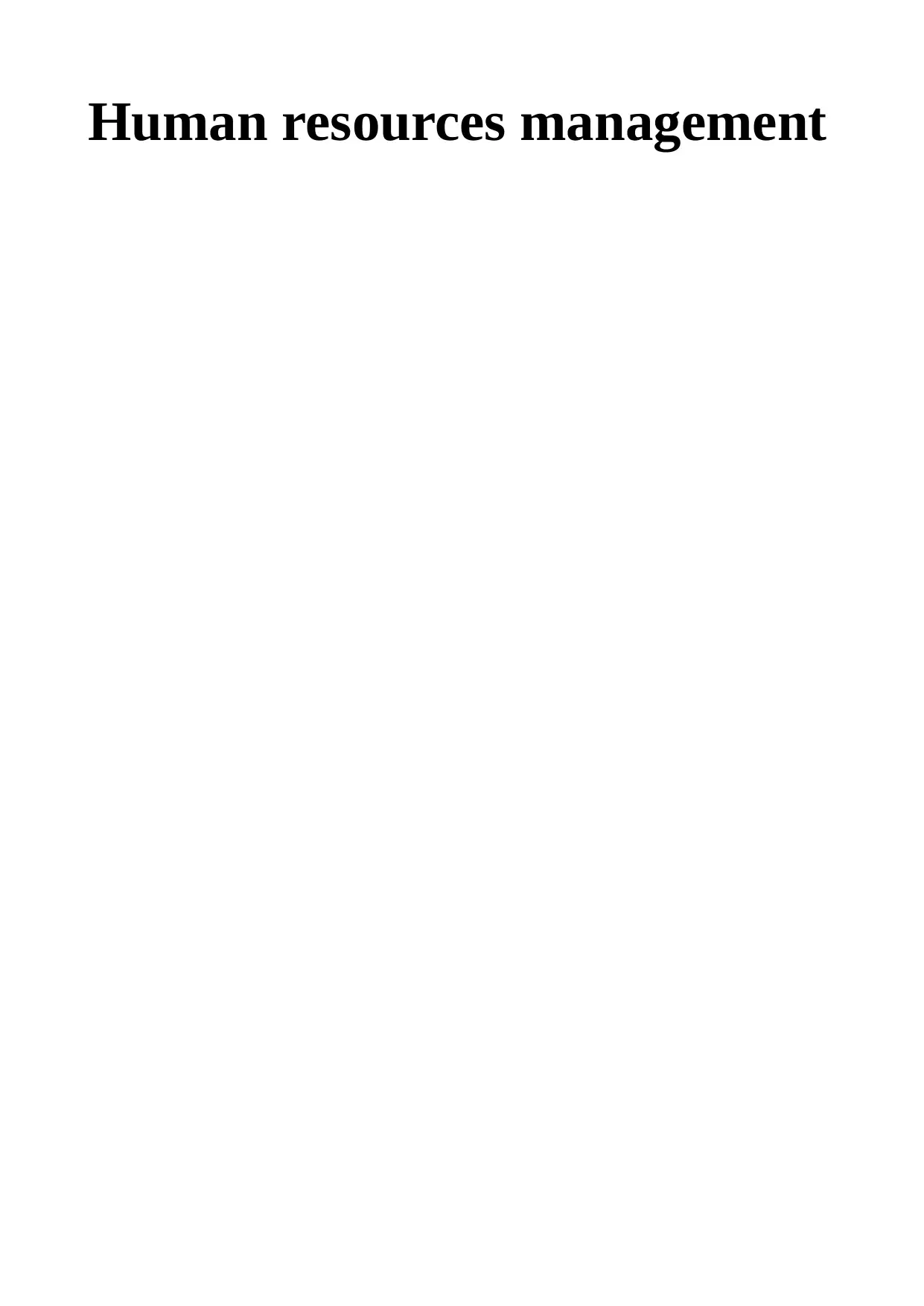
Human resources management
Paraphrase This Document
Need a fresh take? Get an instant paraphrase of this document with our AI Paraphraser
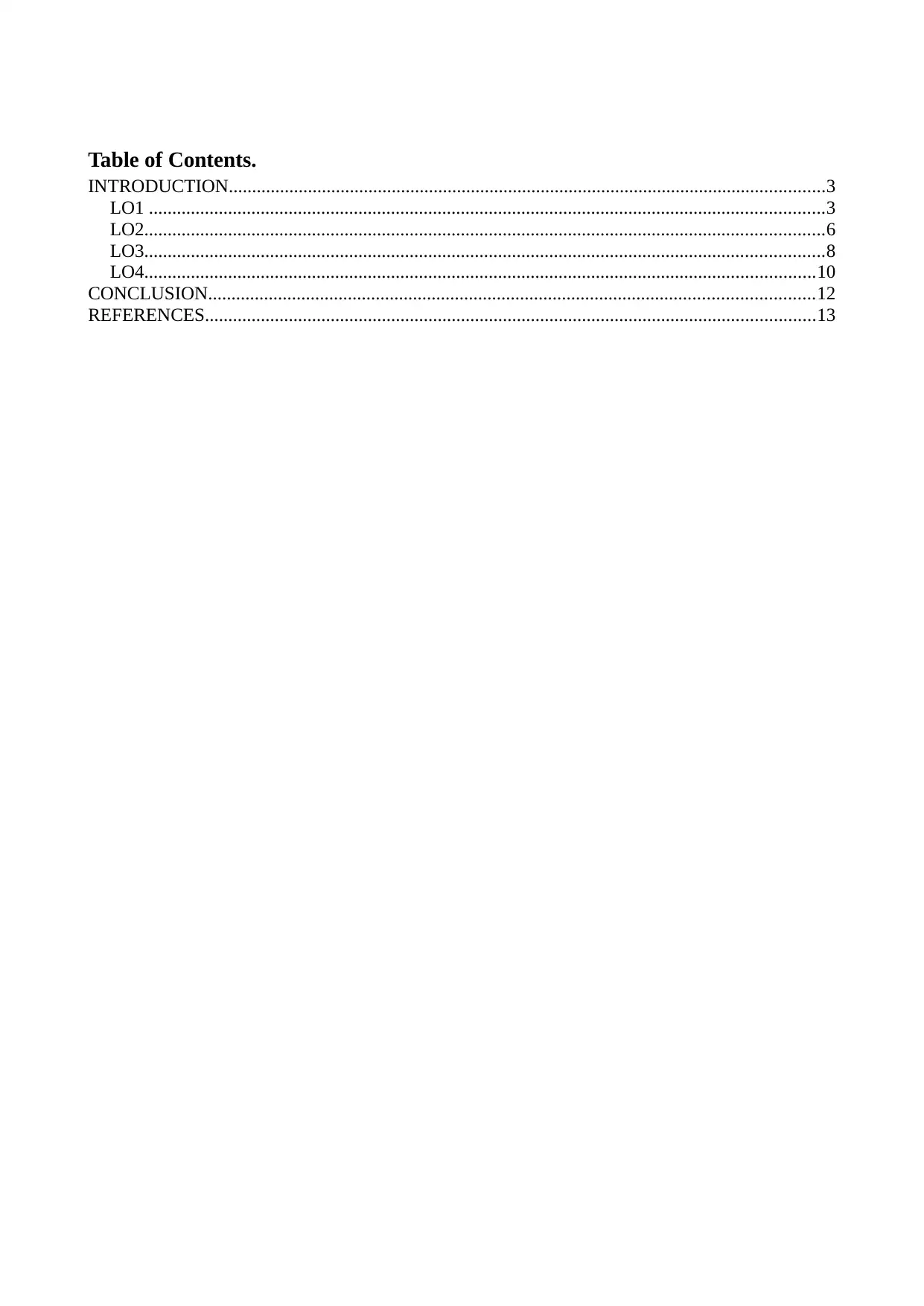
Table of Contents.
INTRODUCTION................................................................................................................................3
LO1 .................................................................................................................................................3
LO2..................................................................................................................................................6
LO3..................................................................................................................................................8
LO4................................................................................................................................................10
CONCLUSION..................................................................................................................................12
REFERENCES...................................................................................................................................13
INTRODUCTION................................................................................................................................3
LO1 .................................................................................................................................................3
LO2..................................................................................................................................................6
LO3..................................................................................................................................................8
LO4................................................................................................................................................10
CONCLUSION..................................................................................................................................12
REFERENCES...................................................................................................................................13
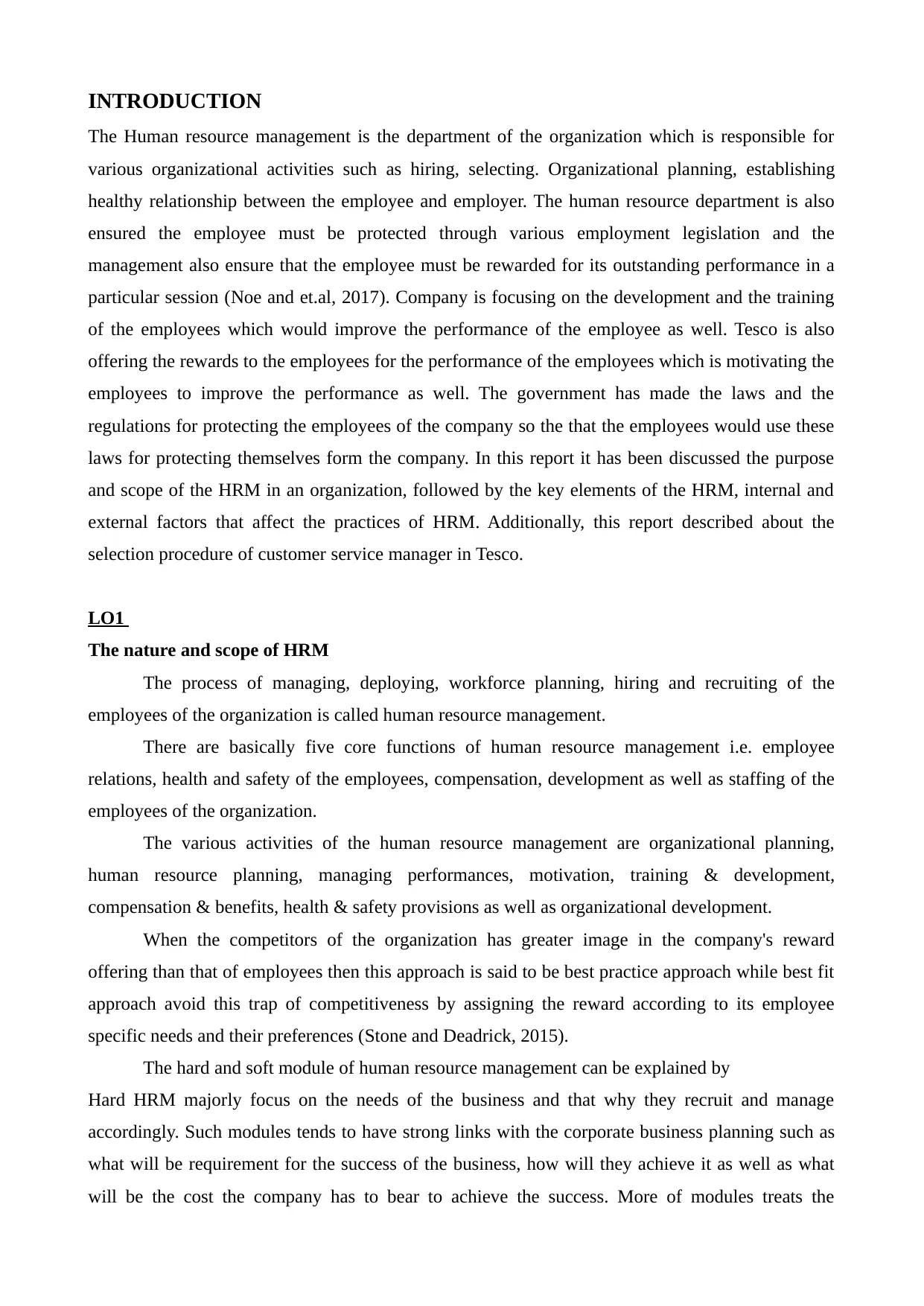
INTRODUCTION
The Human resource management is the department of the organization which is responsible for
various organizational activities such as hiring, selecting. Organizational planning, establishing
healthy relationship between the employee and employer. The human resource department is also
ensured the employee must be protected through various employment legislation and the
management also ensure that the employee must be rewarded for its outstanding performance in a
particular session (Noe and et.al, 2017). Company is focusing on the development and the training
of the employees which would improve the performance of the employee as well. Tesco is also
offering the rewards to the employees for the performance of the employees which is motivating the
employees to improve the performance as well. The government has made the laws and the
regulations for protecting the employees of the company so the that the employees would use these
laws for protecting themselves form the company. In this report it has been discussed the purpose
and scope of the HRM in an organization, followed by the key elements of the HRM, internal and
external factors that affect the practices of HRM. Additionally, this report described about the
selection procedure of customer service manager in Tesco.
LO1
The nature and scope of HRM
The process of managing, deploying, workforce planning, hiring and recruiting of the
employees of the organization is called human resource management.
There are basically five core functions of human resource management i.e. employee
relations, health and safety of the employees, compensation, development as well as staffing of the
employees of the organization.
The various activities of the human resource management are organizational planning,
human resource planning, managing performances, motivation, training & development,
compensation & benefits, health & safety provisions as well as organizational development.
When the competitors of the organization has greater image in the company's reward
offering than that of employees then this approach is said to be best practice approach while best fit
approach avoid this trap of competitiveness by assigning the reward according to its employee
specific needs and their preferences (Stone and Deadrick, 2015).
The hard and soft module of human resource management can be explained by
Hard HRM majorly focus on the needs of the business and that why they recruit and manage
accordingly. Such modules tends to have strong links with the corporate business planning such as
what will be requirement for the success of the business, how will they achieve it as well as what
will be the cost the company has to bear to achieve the success. More of modules treats the
The Human resource management is the department of the organization which is responsible for
various organizational activities such as hiring, selecting. Organizational planning, establishing
healthy relationship between the employee and employer. The human resource department is also
ensured the employee must be protected through various employment legislation and the
management also ensure that the employee must be rewarded for its outstanding performance in a
particular session (Noe and et.al, 2017). Company is focusing on the development and the training
of the employees which would improve the performance of the employee as well. Tesco is also
offering the rewards to the employees for the performance of the employees which is motivating the
employees to improve the performance as well. The government has made the laws and the
regulations for protecting the employees of the company so the that the employees would use these
laws for protecting themselves form the company. In this report it has been discussed the purpose
and scope of the HRM in an organization, followed by the key elements of the HRM, internal and
external factors that affect the practices of HRM. Additionally, this report described about the
selection procedure of customer service manager in Tesco.
LO1
The nature and scope of HRM
The process of managing, deploying, workforce planning, hiring and recruiting of the
employees of the organization is called human resource management.
There are basically five core functions of human resource management i.e. employee
relations, health and safety of the employees, compensation, development as well as staffing of the
employees of the organization.
The various activities of the human resource management are organizational planning,
human resource planning, managing performances, motivation, training & development,
compensation & benefits, health & safety provisions as well as organizational development.
When the competitors of the organization has greater image in the company's reward
offering than that of employees then this approach is said to be best practice approach while best fit
approach avoid this trap of competitiveness by assigning the reward according to its employee
specific needs and their preferences (Stone and Deadrick, 2015).
The hard and soft module of human resource management can be explained by
Hard HRM majorly focus on the needs of the business and that why they recruit and manage
accordingly. Such modules tends to have strong links with the corporate business planning such as
what will be requirement for the success of the business, how will they achieve it as well as what
will be the cost the company has to bear to achieve the success. More of modules treats the
⊘ This is a preview!⊘
Do you want full access?
Subscribe today to unlock all pages.

Trusted by 1+ million students worldwide
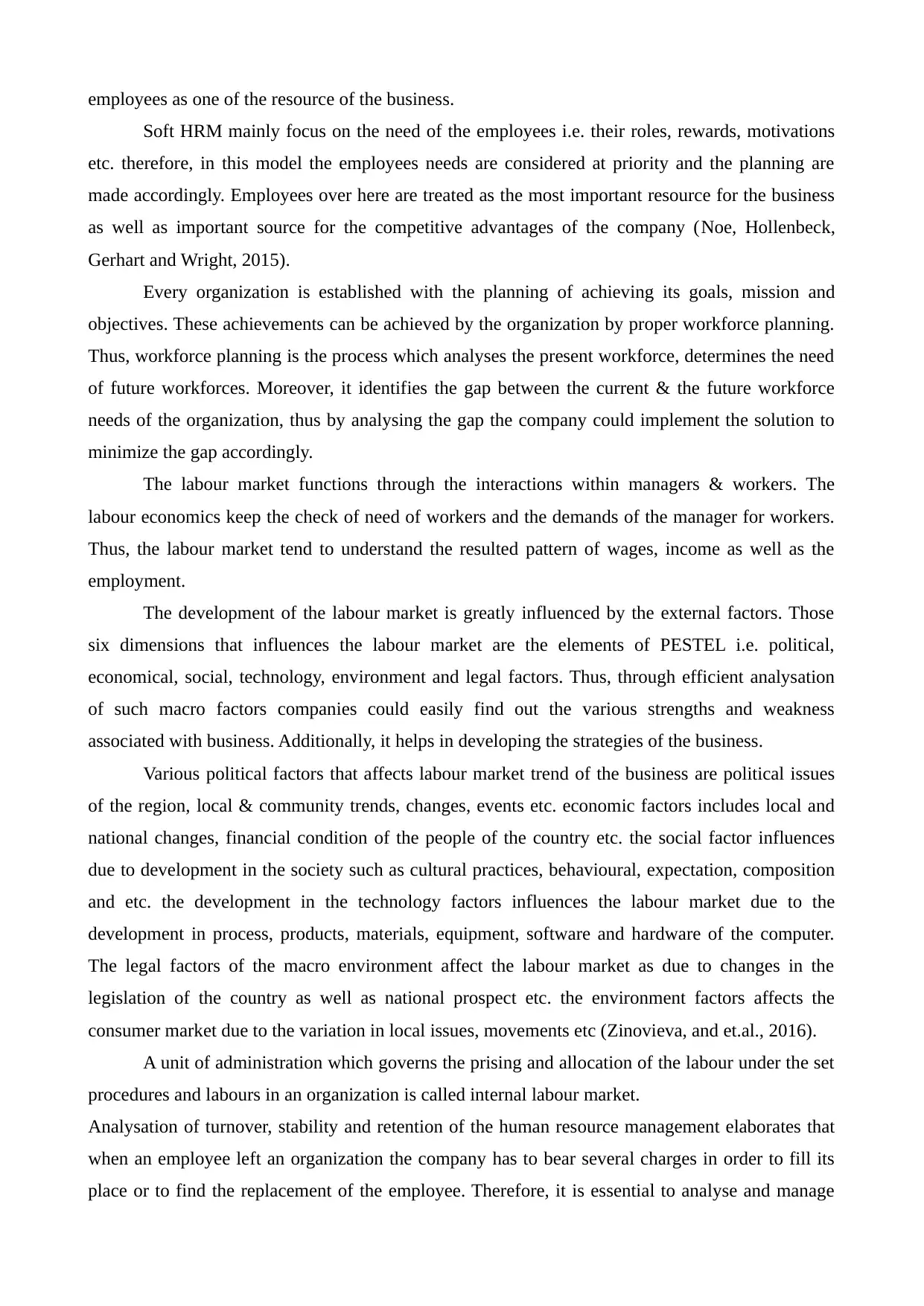
employees as one of the resource of the business.
Soft HRM mainly focus on the need of the employees i.e. their roles, rewards, motivations
etc. therefore, in this model the employees needs are considered at priority and the planning are
made accordingly. Employees over here are treated as the most important resource for the business
as well as important source for the competitive advantages of the company (Noe, Hollenbeck,
Gerhart and Wright, 2015).
Every organization is established with the planning of achieving its goals, mission and
objectives. These achievements can be achieved by the organization by proper workforce planning.
Thus, workforce planning is the process which analyses the present workforce, determines the need
of future workforces. Moreover, it identifies the gap between the current & the future workforce
needs of the organization, thus by analysing the gap the company could implement the solution to
minimize the gap accordingly.
The labour market functions through the interactions within managers & workers. The
labour economics keep the check of need of workers and the demands of the manager for workers.
Thus, the labour market tend to understand the resulted pattern of wages, income as well as the
employment.
The development of the labour market is greatly influenced by the external factors. Those
six dimensions that influences the labour market are the elements of PESTEL i.e. political,
economical, social, technology, environment and legal factors. Thus, through efficient analysation
of such macro factors companies could easily find out the various strengths and weakness
associated with business. Additionally, it helps in developing the strategies of the business.
Various political factors that affects labour market trend of the business are political issues
of the region, local & community trends, changes, events etc. economic factors includes local and
national changes, financial condition of the people of the country etc. the social factor influences
due to development in the society such as cultural practices, behavioural, expectation, composition
and etc. the development in the technology factors influences the labour market due to the
development in process, products, materials, equipment, software and hardware of the computer.
The legal factors of the macro environment affect the labour market as due to changes in the
legislation of the country as well as national prospect etc. the environment factors affects the
consumer market due to the variation in local issues, movements etc (Zinovieva, and et.al., 2016).
A unit of administration which governs the prising and allocation of the labour under the set
procedures and labours in an organization is called internal labour market.
Analysation of turnover, stability and retention of the human resource management elaborates that
when an employee left an organization the company has to bear several charges in order to fill its
place or to find the replacement of the employee. Therefore, it is essential to analyse and manage
Soft HRM mainly focus on the need of the employees i.e. their roles, rewards, motivations
etc. therefore, in this model the employees needs are considered at priority and the planning are
made accordingly. Employees over here are treated as the most important resource for the business
as well as important source for the competitive advantages of the company (Noe, Hollenbeck,
Gerhart and Wright, 2015).
Every organization is established with the planning of achieving its goals, mission and
objectives. These achievements can be achieved by the organization by proper workforce planning.
Thus, workforce planning is the process which analyses the present workforce, determines the need
of future workforces. Moreover, it identifies the gap between the current & the future workforce
needs of the organization, thus by analysing the gap the company could implement the solution to
minimize the gap accordingly.
The labour market functions through the interactions within managers & workers. The
labour economics keep the check of need of workers and the demands of the manager for workers.
Thus, the labour market tend to understand the resulted pattern of wages, income as well as the
employment.
The development of the labour market is greatly influenced by the external factors. Those
six dimensions that influences the labour market are the elements of PESTEL i.e. political,
economical, social, technology, environment and legal factors. Thus, through efficient analysation
of such macro factors companies could easily find out the various strengths and weakness
associated with business. Additionally, it helps in developing the strategies of the business.
Various political factors that affects labour market trend of the business are political issues
of the region, local & community trends, changes, events etc. economic factors includes local and
national changes, financial condition of the people of the country etc. the social factor influences
due to development in the society such as cultural practices, behavioural, expectation, composition
and etc. the development in the technology factors influences the labour market due to the
development in process, products, materials, equipment, software and hardware of the computer.
The legal factors of the macro environment affect the labour market as due to changes in the
legislation of the country as well as national prospect etc. the environment factors affects the
consumer market due to the variation in local issues, movements etc (Zinovieva, and et.al., 2016).
A unit of administration which governs the prising and allocation of the labour under the set
procedures and labours in an organization is called internal labour market.
Analysation of turnover, stability and retention of the human resource management elaborates that
when an employee left an organization the company has to bear several charges in order to fill its
place or to find the replacement of the employee. Therefore, it is essential to analyse and manage
Paraphrase This Document
Need a fresh take? Get an instant paraphrase of this document with our AI Paraphraser
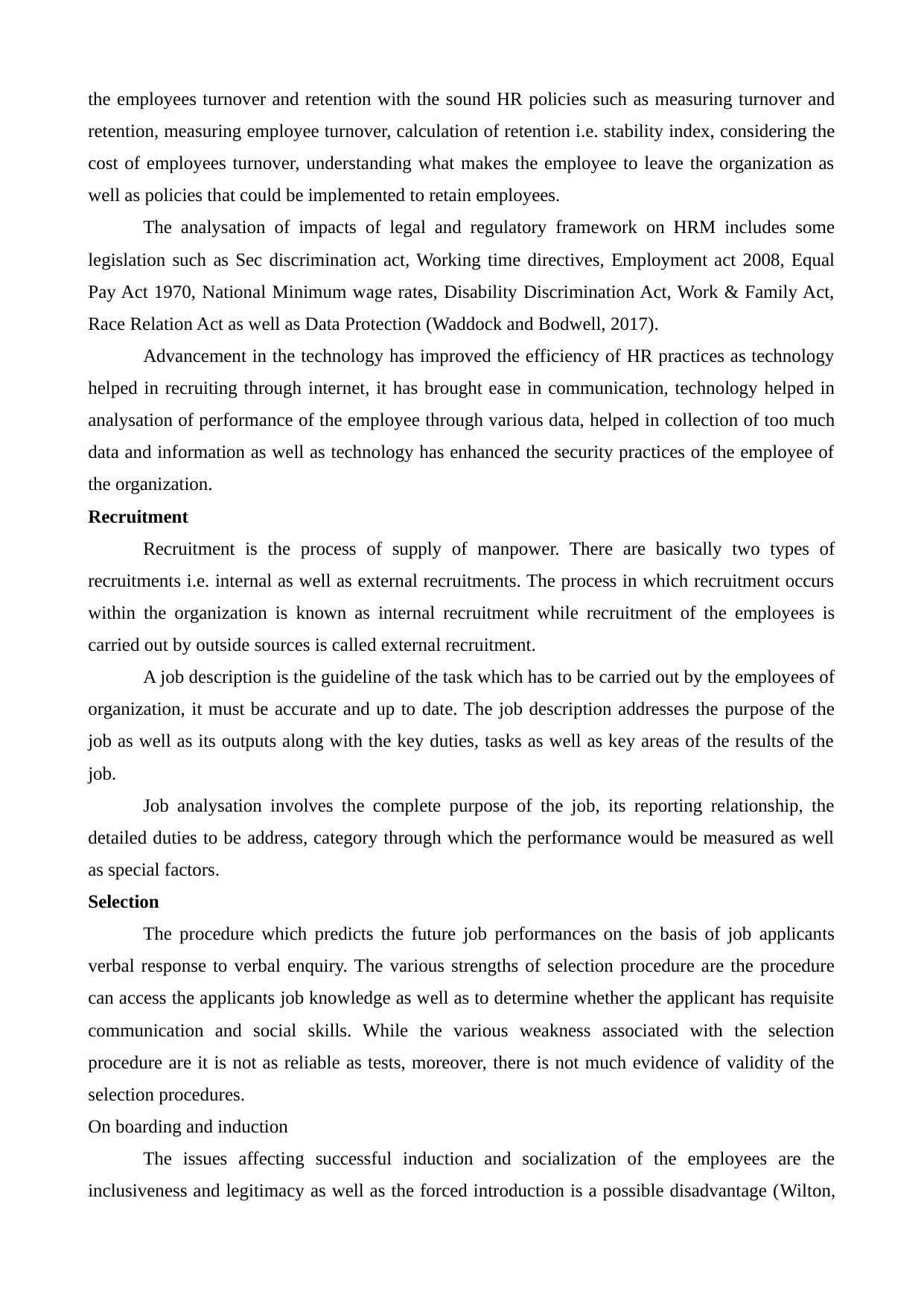
the employees turnover and retention with the sound HR policies such as measuring turnover and
retention, measuring employee turnover, calculation of retention i.e. stability index, considering the
cost of employees turnover, understanding what makes the employee to leave the organization as
well as policies that could be implemented to retain employees.
The analysation of impacts of legal and regulatory framework on HRM includes some
legislation such as Sec discrimination act, Working time directives, Employment act 2008, Equal
Pay Act 1970, National Minimum wage rates, Disability Discrimination Act, Work & Family Act,
Race Relation Act as well as Data Protection (Waddock and Bodwell, 2017).
Advancement in the technology has improved the efficiency of HR practices as technology
helped in recruiting through internet, it has brought ease in communication, technology helped in
analysation of performance of the employee through various data, helped in collection of too much
data and information as well as technology has enhanced the security practices of the employee of
the organization.
Recruitment
Recruitment is the process of supply of manpower. There are basically two types of
recruitments i.e. internal as well as external recruitments. The process in which recruitment occurs
within the organization is known as internal recruitment while recruitment of the employees is
carried out by outside sources is called external recruitment.
A job description is the guideline of the task which has to be carried out by the employees of
organization, it must be accurate and up to date. The job description addresses the purpose of the
job as well as its outputs along with the key duties, tasks as well as key areas of the results of the
job.
Job analysation involves the complete purpose of the job, its reporting relationship, the
detailed duties to be address, category through which the performance would be measured as well
as special factors.
Selection
The procedure which predicts the future job performances on the basis of job applicants
verbal response to verbal enquiry. The various strengths of selection procedure are the procedure
can access the applicants job knowledge as well as to determine whether the applicant has requisite
communication and social skills. While the various weakness associated with the selection
procedure are it is not as reliable as tests, moreover, there is not much evidence of validity of the
selection procedures.
On boarding and induction
The issues affecting successful induction and socialization of the employees are the
inclusiveness and legitimacy as well as the forced introduction is a possible disadvantage (Wilton,
retention, measuring employee turnover, calculation of retention i.e. stability index, considering the
cost of employees turnover, understanding what makes the employee to leave the organization as
well as policies that could be implemented to retain employees.
The analysation of impacts of legal and regulatory framework on HRM includes some
legislation such as Sec discrimination act, Working time directives, Employment act 2008, Equal
Pay Act 1970, National Minimum wage rates, Disability Discrimination Act, Work & Family Act,
Race Relation Act as well as Data Protection (Waddock and Bodwell, 2017).
Advancement in the technology has improved the efficiency of HR practices as technology
helped in recruiting through internet, it has brought ease in communication, technology helped in
analysation of performance of the employee through various data, helped in collection of too much
data and information as well as technology has enhanced the security practices of the employee of
the organization.
Recruitment
Recruitment is the process of supply of manpower. There are basically two types of
recruitments i.e. internal as well as external recruitments. The process in which recruitment occurs
within the organization is known as internal recruitment while recruitment of the employees is
carried out by outside sources is called external recruitment.
A job description is the guideline of the task which has to be carried out by the employees of
organization, it must be accurate and up to date. The job description addresses the purpose of the
job as well as its outputs along with the key duties, tasks as well as key areas of the results of the
job.
Job analysation involves the complete purpose of the job, its reporting relationship, the
detailed duties to be address, category through which the performance would be measured as well
as special factors.
Selection
The procedure which predicts the future job performances on the basis of job applicants
verbal response to verbal enquiry. The various strengths of selection procedure are the procedure
can access the applicants job knowledge as well as to determine whether the applicant has requisite
communication and social skills. While the various weakness associated with the selection
procedure are it is not as reliable as tests, moreover, there is not much evidence of validity of the
selection procedures.
On boarding and induction
The issues affecting successful induction and socialization of the employees are the
inclusiveness and legitimacy as well as the forced introduction is a possible disadvantage (Wilton,
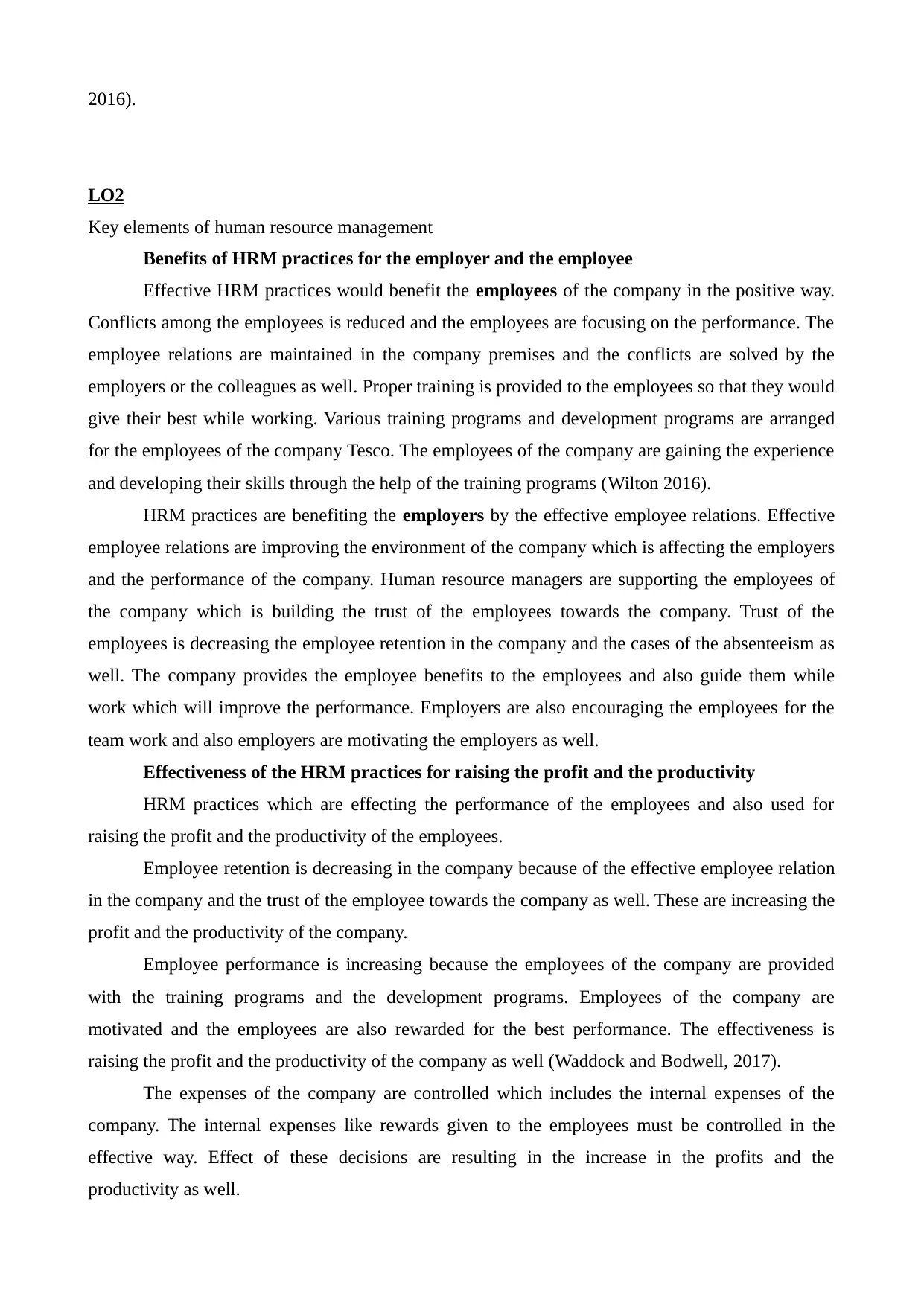
2016).
LO2
Key elements of human resource management
Benefits of HRM practices for the employer and the employee
Effective HRM practices would benefit the employees of the company in the positive way.
Conflicts among the employees is reduced and the employees are focusing on the performance. The
employee relations are maintained in the company premises and the conflicts are solved by the
employers or the colleagues as well. Proper training is provided to the employees so that they would
give their best while working. Various training programs and development programs are arranged
for the employees of the company Tesco. The employees of the company are gaining the experience
and developing their skills through the help of the training programs (Wilton 2016).
HRM practices are benefiting the employers by the effective employee relations. Effective
employee relations are improving the environment of the company which is affecting the employers
and the performance of the company. Human resource managers are supporting the employees of
the company which is building the trust of the employees towards the company. Trust of the
employees is decreasing the employee retention in the company and the cases of the absenteeism as
well. The company provides the employee benefits to the employees and also guide them while
work which will improve the performance. Employers are also encouraging the employees for the
team work and also employers are motivating the employers as well.
Effectiveness of the HRM practices for raising the profit and the productivity
HRM practices which are effecting the performance of the employees and also used for
raising the profit and the productivity of the employees.
Employee retention is decreasing in the company because of the effective employee relation
in the company and the trust of the employee towards the company as well. These are increasing the
profit and the productivity of the company.
Employee performance is increasing because the employees of the company are provided
with the training programs and the development programs. Employees of the company are
motivated and the employees are also rewarded for the best performance. The effectiveness is
raising the profit and the productivity of the company as well (Waddock and Bodwell, 2017).
The expenses of the company are controlled which includes the internal expenses of the
company. The internal expenses like rewards given to the employees must be controlled in the
effective way. Effect of these decisions are resulting in the increase in the profits and the
productivity as well.
LO2
Key elements of human resource management
Benefits of HRM practices for the employer and the employee
Effective HRM practices would benefit the employees of the company in the positive way.
Conflicts among the employees is reduced and the employees are focusing on the performance. The
employee relations are maintained in the company premises and the conflicts are solved by the
employers or the colleagues as well. Proper training is provided to the employees so that they would
give their best while working. Various training programs and development programs are arranged
for the employees of the company Tesco. The employees of the company are gaining the experience
and developing their skills through the help of the training programs (Wilton 2016).
HRM practices are benefiting the employers by the effective employee relations. Effective
employee relations are improving the environment of the company which is affecting the employers
and the performance of the company. Human resource managers are supporting the employees of
the company which is building the trust of the employees towards the company. Trust of the
employees is decreasing the employee retention in the company and the cases of the absenteeism as
well. The company provides the employee benefits to the employees and also guide them while
work which will improve the performance. Employers are also encouraging the employees for the
team work and also employers are motivating the employers as well.
Effectiveness of the HRM practices for raising the profit and the productivity
HRM practices which are effecting the performance of the employees and also used for
raising the profit and the productivity of the employees.
Employee retention is decreasing in the company because of the effective employee relation
in the company and the trust of the employee towards the company as well. These are increasing the
profit and the productivity of the company.
Employee performance is increasing because the employees of the company are provided
with the training programs and the development programs. Employees of the company are
motivated and the employees are also rewarded for the best performance. The effectiveness is
raising the profit and the productivity of the company as well (Waddock and Bodwell, 2017).
The expenses of the company are controlled which includes the internal expenses of the
company. The internal expenses like rewards given to the employees must be controlled in the
effective way. Effect of these decisions are resulting in the increase in the profits and the
productivity as well.
⊘ This is a preview!⊘
Do you want full access?
Subscribe today to unlock all pages.

Trusted by 1+ million students worldwide
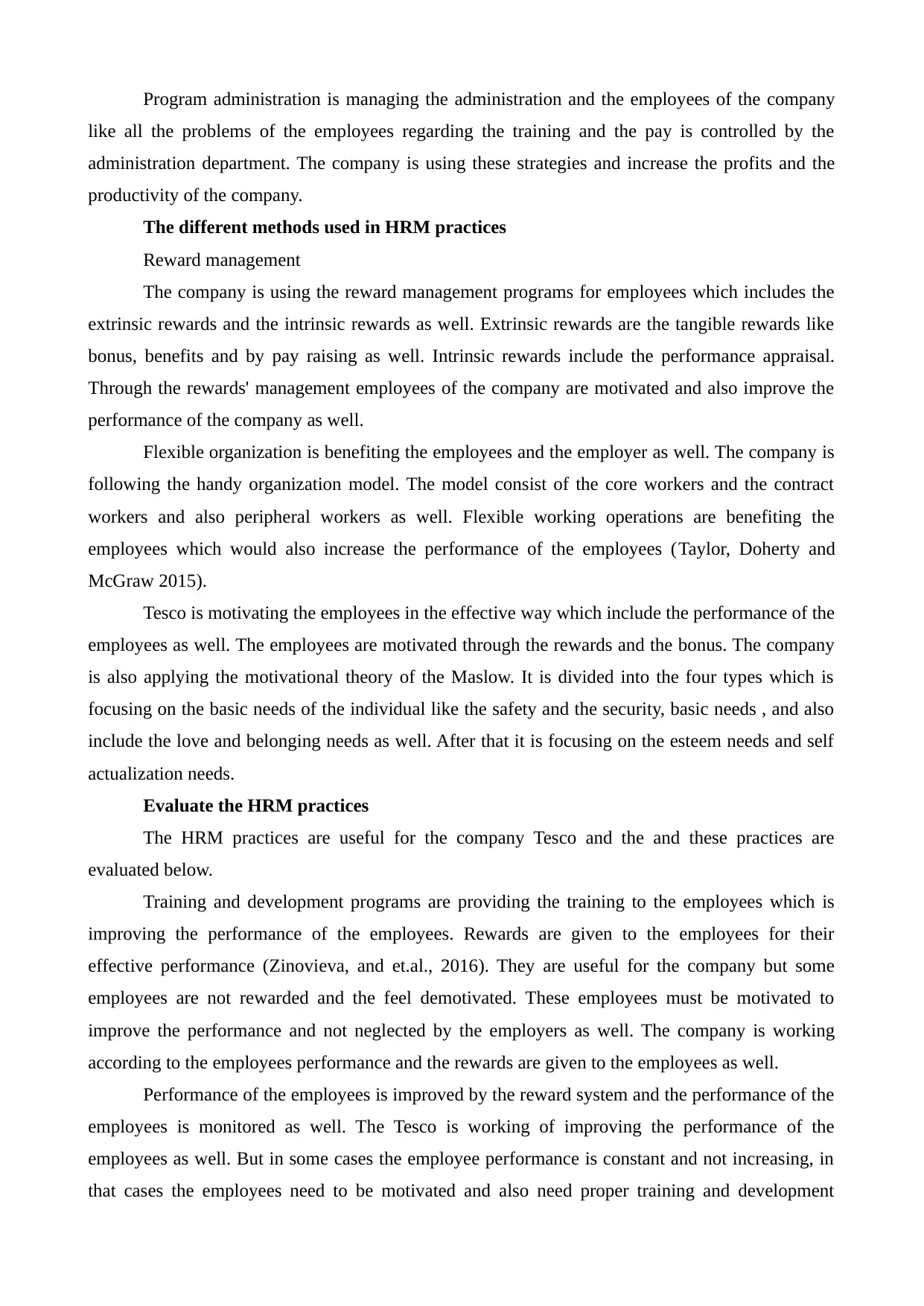
Program administration is managing the administration and the employees of the company
like all the problems of the employees regarding the training and the pay is controlled by the
administration department. The company is using these strategies and increase the profits and the
productivity of the company.
The different methods used in HRM practices
Reward management
The company is using the reward management programs for employees which includes the
extrinsic rewards and the intrinsic rewards as well. Extrinsic rewards are the tangible rewards like
bonus, benefits and by pay raising as well. Intrinsic rewards include the performance appraisal.
Through the rewards' management employees of the company are motivated and also improve the
performance of the company as well.
Flexible organization is benefiting the employees and the employer as well. The company is
following the handy organization model. The model consist of the core workers and the contract
workers and also peripheral workers as well. Flexible working operations are benefiting the
employees which would also increase the performance of the employees (Taylor, Doherty and
McGraw 2015).
Tesco is motivating the employees in the effective way which include the performance of the
employees as well. The employees are motivated through the rewards and the bonus. The company
is also applying the motivational theory of the Maslow. It is divided into the four types which is
focusing on the basic needs of the individual like the safety and the security, basic needs , and also
include the love and belonging needs as well. After that it is focusing on the esteem needs and self
actualization needs.
Evaluate the HRM practices
The HRM practices are useful for the company Tesco and the and these practices are
evaluated below.
Training and development programs are providing the training to the employees which is
improving the performance of the employees. Rewards are given to the employees for their
effective performance (Zinovieva, and et.al., 2016). They are useful for the company but some
employees are not rewarded and the feel demotivated. These employees must be motivated to
improve the performance and not neglected by the employers as well. The company is working
according to the employees performance and the rewards are given to the employees as well.
Performance of the employees is improved by the reward system and the performance of the
employees is monitored as well. The Tesco is working of improving the performance of the
employees as well. But in some cases the employee performance is constant and not increasing, in
that cases the employees need to be motivated and also need proper training and development
like all the problems of the employees regarding the training and the pay is controlled by the
administration department. The company is using these strategies and increase the profits and the
productivity of the company.
The different methods used in HRM practices
Reward management
The company is using the reward management programs for employees which includes the
extrinsic rewards and the intrinsic rewards as well. Extrinsic rewards are the tangible rewards like
bonus, benefits and by pay raising as well. Intrinsic rewards include the performance appraisal.
Through the rewards' management employees of the company are motivated and also improve the
performance of the company as well.
Flexible organization is benefiting the employees and the employer as well. The company is
following the handy organization model. The model consist of the core workers and the contract
workers and also peripheral workers as well. Flexible working operations are benefiting the
employees which would also increase the performance of the employees (Taylor, Doherty and
McGraw 2015).
Tesco is motivating the employees in the effective way which include the performance of the
employees as well. The employees are motivated through the rewards and the bonus. The company
is also applying the motivational theory of the Maslow. It is divided into the four types which is
focusing on the basic needs of the individual like the safety and the security, basic needs , and also
include the love and belonging needs as well. After that it is focusing on the esteem needs and self
actualization needs.
Evaluate the HRM practices
The HRM practices are useful for the company Tesco and the and these practices are
evaluated below.
Training and development programs are providing the training to the employees which is
improving the performance of the employees. Rewards are given to the employees for their
effective performance (Zinovieva, and et.al., 2016). They are useful for the company but some
employees are not rewarded and the feel demotivated. These employees must be motivated to
improve the performance and not neglected by the employers as well. The company is working
according to the employees performance and the rewards are given to the employees as well.
Performance of the employees is improved by the reward system and the performance of the
employees is monitored as well. The Tesco is working of improving the performance of the
employees as well. But in some cases the employee performance is constant and not increasing, in
that cases the employees need to be motivated and also need proper training and development
Paraphrase This Document
Need a fresh take? Get an instant paraphrase of this document with our AI Paraphraser
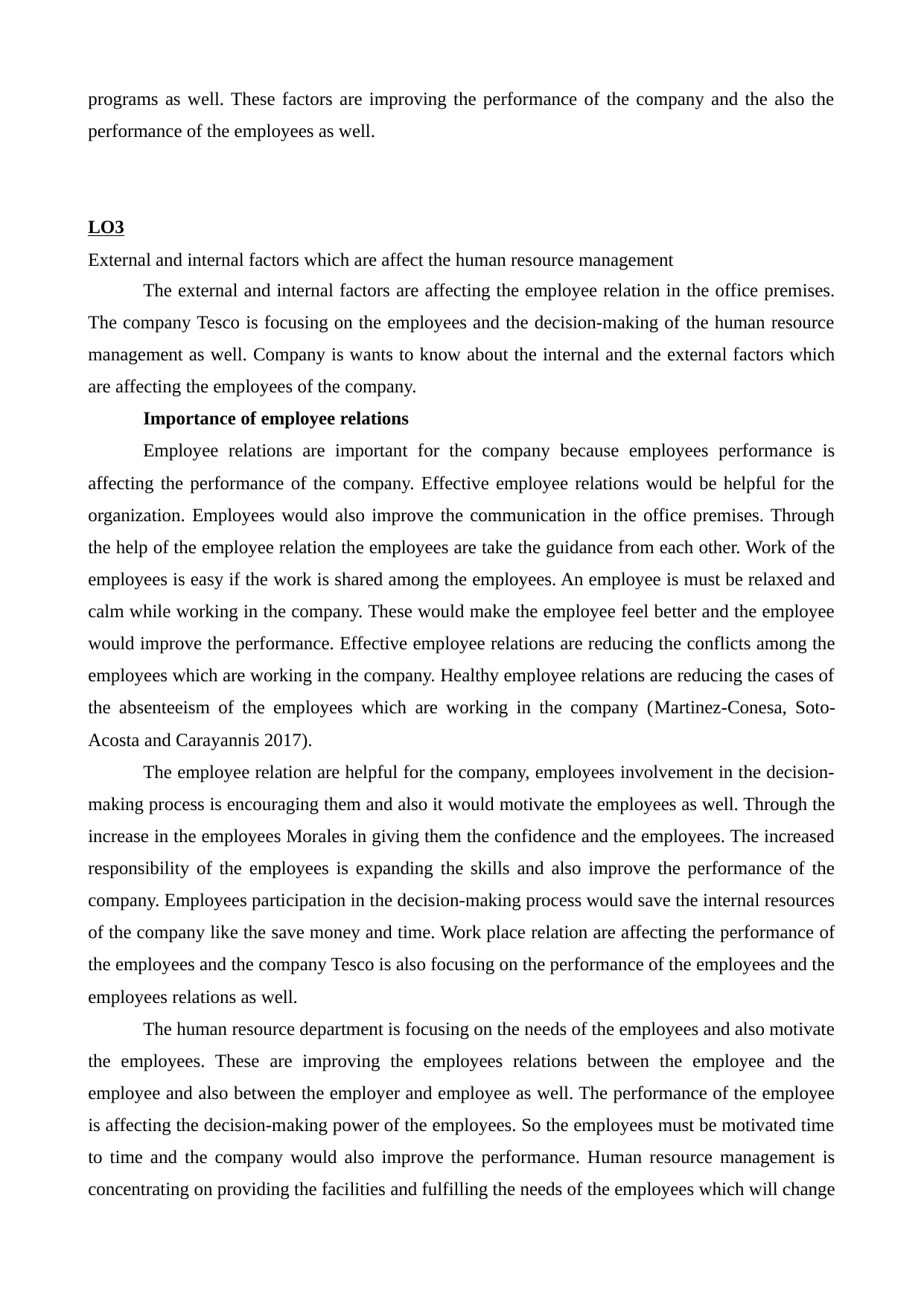
programs as well. These factors are improving the performance of the company and the also the
performance of the employees as well.
LO3
External and internal factors which are affect the human resource management
The external and internal factors are affecting the employee relation in the office premises.
The company Tesco is focusing on the employees and the decision-making of the human resource
management as well. Company is wants to know about the internal and the external factors which
are affecting the employees of the company.
Importance of employee relations
Employee relations are important for the company because employees performance is
affecting the performance of the company. Effective employee relations would be helpful for the
organization. Employees would also improve the communication in the office premises. Through
the help of the employee relation the employees are take the guidance from each other. Work of the
employees is easy if the work is shared among the employees. An employee is must be relaxed and
calm while working in the company. These would make the employee feel better and the employee
would improve the performance. Effective employee relations are reducing the conflicts among the
employees which are working in the company. Healthy employee relations are reducing the cases of
the absenteeism of the employees which are working in the company (Martinez-Conesa, Soto-
Acosta and Carayannis 2017).
The employee relation are helpful for the company, employees involvement in the decision-
making process is encouraging them and also it would motivate the employees as well. Through the
increase in the employees Morales in giving them the confidence and the employees. The increased
responsibility of the employees is expanding the skills and also improve the performance of the
company. Employees participation in the decision-making process would save the internal resources
of the company like the save money and time. Work place relation are affecting the performance of
the employees and the company Tesco is also focusing on the performance of the employees and the
employees relations as well.
The human resource department is focusing on the needs of the employees and also motivate
the employees. These are improving the employees relations between the employee and the
employee and also between the employer and employee as well. The performance of the employee
is affecting the decision-making power of the employees. So the employees must be motivated time
to time and the company would also improve the performance. Human resource management is
concentrating on providing the facilities and fulfilling the needs of the employees which will change
performance of the employees as well.
LO3
External and internal factors which are affect the human resource management
The external and internal factors are affecting the employee relation in the office premises.
The company Tesco is focusing on the employees and the decision-making of the human resource
management as well. Company is wants to know about the internal and the external factors which
are affecting the employees of the company.
Importance of employee relations
Employee relations are important for the company because employees performance is
affecting the performance of the company. Effective employee relations would be helpful for the
organization. Employees would also improve the communication in the office premises. Through
the help of the employee relation the employees are take the guidance from each other. Work of the
employees is easy if the work is shared among the employees. An employee is must be relaxed and
calm while working in the company. These would make the employee feel better and the employee
would improve the performance. Effective employee relations are reducing the conflicts among the
employees which are working in the company. Healthy employee relations are reducing the cases of
the absenteeism of the employees which are working in the company (Martinez-Conesa, Soto-
Acosta and Carayannis 2017).
The employee relation are helpful for the company, employees involvement in the decision-
making process is encouraging them and also it would motivate the employees as well. Through the
increase in the employees Morales in giving them the confidence and the employees. The increased
responsibility of the employees is expanding the skills and also improve the performance of the
company. Employees participation in the decision-making process would save the internal resources
of the company like the save money and time. Work place relation are affecting the performance of
the employees and the company Tesco is also focusing on the performance of the employees and the
employees relations as well.
The human resource department is focusing on the needs of the employees and also motivate
the employees. These are improving the employees relations between the employee and the
employee and also between the employer and employee as well. The performance of the employee
is affecting the decision-making power of the employees. So the employees must be motivated time
to time and the company would also improve the performance. Human resource management is
concentrating on providing the facilities and fulfilling the needs of the employees which will change
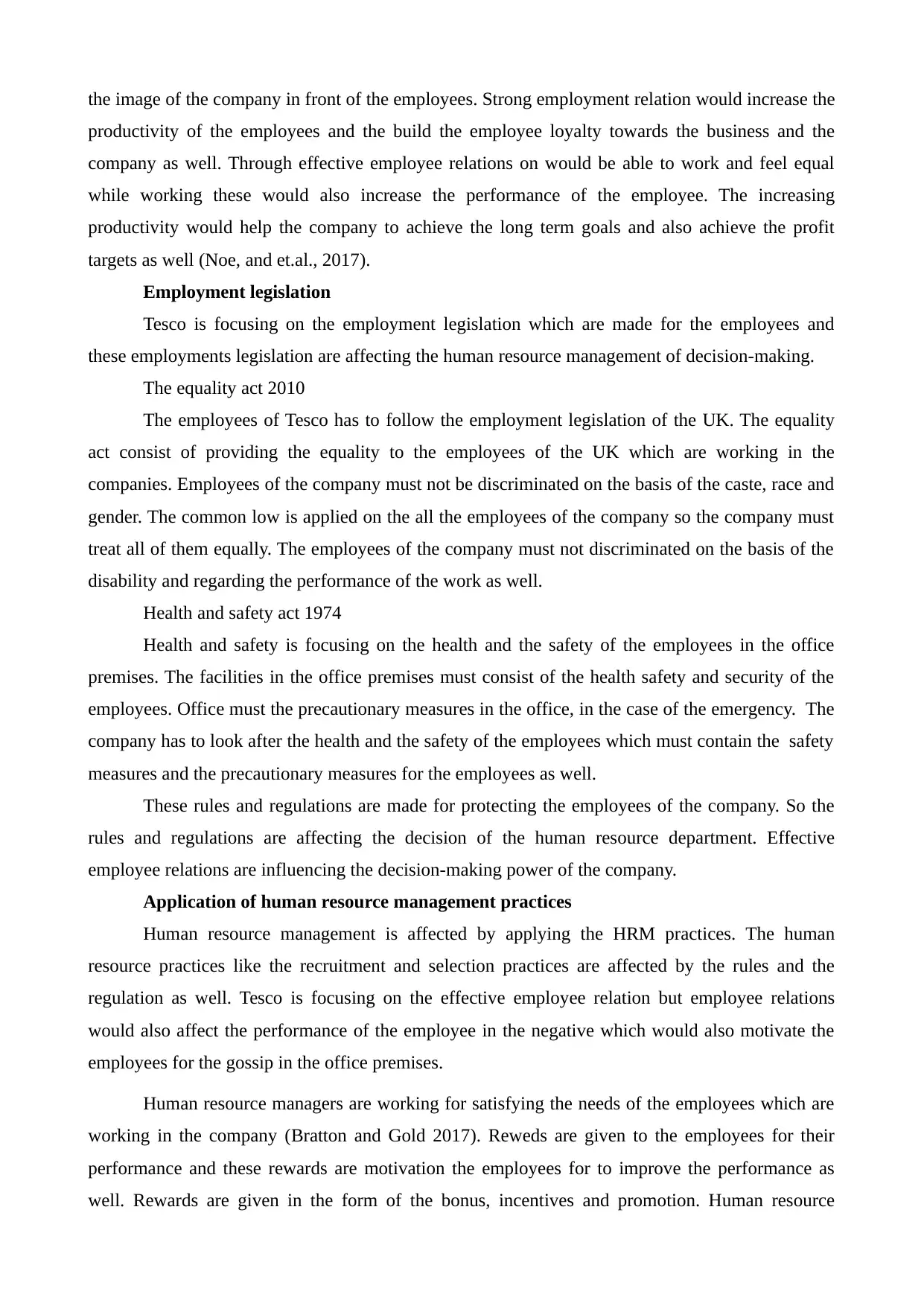
the image of the company in front of the employees. Strong employment relation would increase the
productivity of the employees and the build the employee loyalty towards the business and the
company as well. Through effective employee relations on would be able to work and feel equal
while working these would also increase the performance of the employee. The increasing
productivity would help the company to achieve the long term goals and also achieve the profit
targets as well (Noe, and et.al., 2017).
Employment legislation
Tesco is focusing on the employment legislation which are made for the employees and
these employments legislation are affecting the human resource management of decision-making.
The equality act 2010
The employees of Tesco has to follow the employment legislation of the UK. The equality
act consist of providing the equality to the employees of the UK which are working in the
companies. Employees of the company must not be discriminated on the basis of the caste, race and
gender. The common low is applied on the all the employees of the company so the company must
treat all of them equally. The employees of the company must not discriminated on the basis of the
disability and regarding the performance of the work as well.
Health and safety act 1974
Health and safety is focusing on the health and the safety of the employees in the office
premises. The facilities in the office premises must consist of the health safety and security of the
employees. Office must the precautionary measures in the office, in the case of the emergency. The
company has to look after the health and the safety of the employees which must contain the safety
measures and the precautionary measures for the employees as well.
These rules and regulations are made for protecting the employees of the company. So the
rules and regulations are affecting the decision of the human resource department. Effective
employee relations are influencing the decision-making power of the company.
Application of human resource management practices
Human resource management is affected by applying the HRM practices. The human
resource practices like the recruitment and selection practices are affected by the rules and the
regulation as well. Tesco is focusing on the effective employee relation but employee relations
would also affect the performance of the employee in the negative which would also motivate the
employees for the gossip in the office premises.
Human resource managers are working for satisfying the needs of the employees which are
working in the company (Bratton and Gold 2017). Reweds are given to the employees for their
performance and these rewards are motivation the employees for to improve the performance as
well. Rewards are given in the form of the bonus, incentives and promotion. Human resource
productivity of the employees and the build the employee loyalty towards the business and the
company as well. Through effective employee relations on would be able to work and feel equal
while working these would also increase the performance of the employee. The increasing
productivity would help the company to achieve the long term goals and also achieve the profit
targets as well (Noe, and et.al., 2017).
Employment legislation
Tesco is focusing on the employment legislation which are made for the employees and
these employments legislation are affecting the human resource management of decision-making.
The equality act 2010
The employees of Tesco has to follow the employment legislation of the UK. The equality
act consist of providing the equality to the employees of the UK which are working in the
companies. Employees of the company must not be discriminated on the basis of the caste, race and
gender. The common low is applied on the all the employees of the company so the company must
treat all of them equally. The employees of the company must not discriminated on the basis of the
disability and regarding the performance of the work as well.
Health and safety act 1974
Health and safety is focusing on the health and the safety of the employees in the office
premises. The facilities in the office premises must consist of the health safety and security of the
employees. Office must the precautionary measures in the office, in the case of the emergency. The
company has to look after the health and the safety of the employees which must contain the safety
measures and the precautionary measures for the employees as well.
These rules and regulations are made for protecting the employees of the company. So the
rules and regulations are affecting the decision of the human resource department. Effective
employee relations are influencing the decision-making power of the company.
Application of human resource management practices
Human resource management is affected by applying the HRM practices. The human
resource practices like the recruitment and selection practices are affected by the rules and the
regulation as well. Tesco is focusing on the effective employee relation but employee relations
would also affect the performance of the employee in the negative which would also motivate the
employees for the gossip in the office premises.
Human resource managers are working for satisfying the needs of the employees which are
working in the company (Bratton and Gold 2017). Reweds are given to the employees for their
performance and these rewards are motivation the employees for to improve the performance as
well. Rewards are given in the form of the bonus, incentives and promotion. Human resource
⊘ This is a preview!⊘
Do you want full access?
Subscribe today to unlock all pages.

Trusted by 1+ million students worldwide
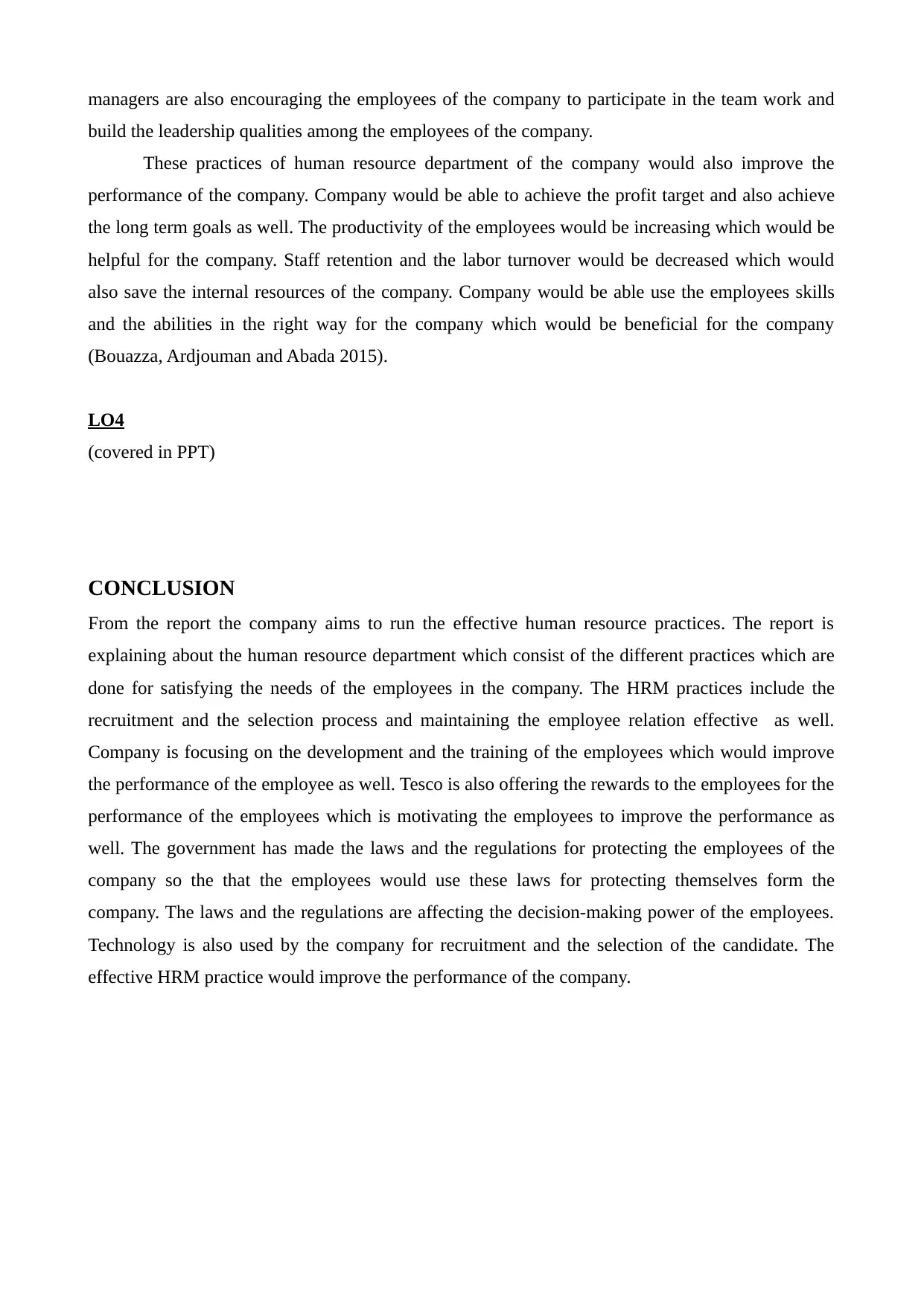
managers are also encouraging the employees of the company to participate in the team work and
build the leadership qualities among the employees of the company.
These practices of human resource department of the company would also improve the
performance of the company. Company would be able to achieve the profit target and also achieve
the long term goals as well. The productivity of the employees would be increasing which would be
helpful for the company. Staff retention and the labor turnover would be decreased which would
also save the internal resources of the company. Company would be able use the employees skills
and the abilities in the right way for the company which would be beneficial for the company
(Bouazza, Ardjouman and Abada 2015).
LO4
(covered in PPT)
CONCLUSION
From the report the company aims to run the effective human resource practices. The report is
explaining about the human resource department which consist of the different practices which are
done for satisfying the needs of the employees in the company. The HRM practices include the
recruitment and the selection process and maintaining the employee relation effective as well.
Company is focusing on the development and the training of the employees which would improve
the performance of the employee as well. Tesco is also offering the rewards to the employees for the
performance of the employees which is motivating the employees to improve the performance as
well. The government has made the laws and the regulations for protecting the employees of the
company so the that the employees would use these laws for protecting themselves form the
company. The laws and the regulations are affecting the decision-making power of the employees.
Technology is also used by the company for recruitment and the selection of the candidate. The
effective HRM practice would improve the performance of the company.
build the leadership qualities among the employees of the company.
These practices of human resource department of the company would also improve the
performance of the company. Company would be able to achieve the profit target and also achieve
the long term goals as well. The productivity of the employees would be increasing which would be
helpful for the company. Staff retention and the labor turnover would be decreased which would
also save the internal resources of the company. Company would be able use the employees skills
and the abilities in the right way for the company which would be beneficial for the company
(Bouazza, Ardjouman and Abada 2015).
LO4
(covered in PPT)
CONCLUSION
From the report the company aims to run the effective human resource practices. The report is
explaining about the human resource department which consist of the different practices which are
done for satisfying the needs of the employees in the company. The HRM practices include the
recruitment and the selection process and maintaining the employee relation effective as well.
Company is focusing on the development and the training of the employees which would improve
the performance of the employee as well. Tesco is also offering the rewards to the employees for the
performance of the employees which is motivating the employees to improve the performance as
well. The government has made the laws and the regulations for protecting the employees of the
company so the that the employees would use these laws for protecting themselves form the
company. The laws and the regulations are affecting the decision-making power of the employees.
Technology is also used by the company for recruitment and the selection of the candidate. The
effective HRM practice would improve the performance of the company.
Paraphrase This Document
Need a fresh take? Get an instant paraphrase of this document with our AI Paraphraser
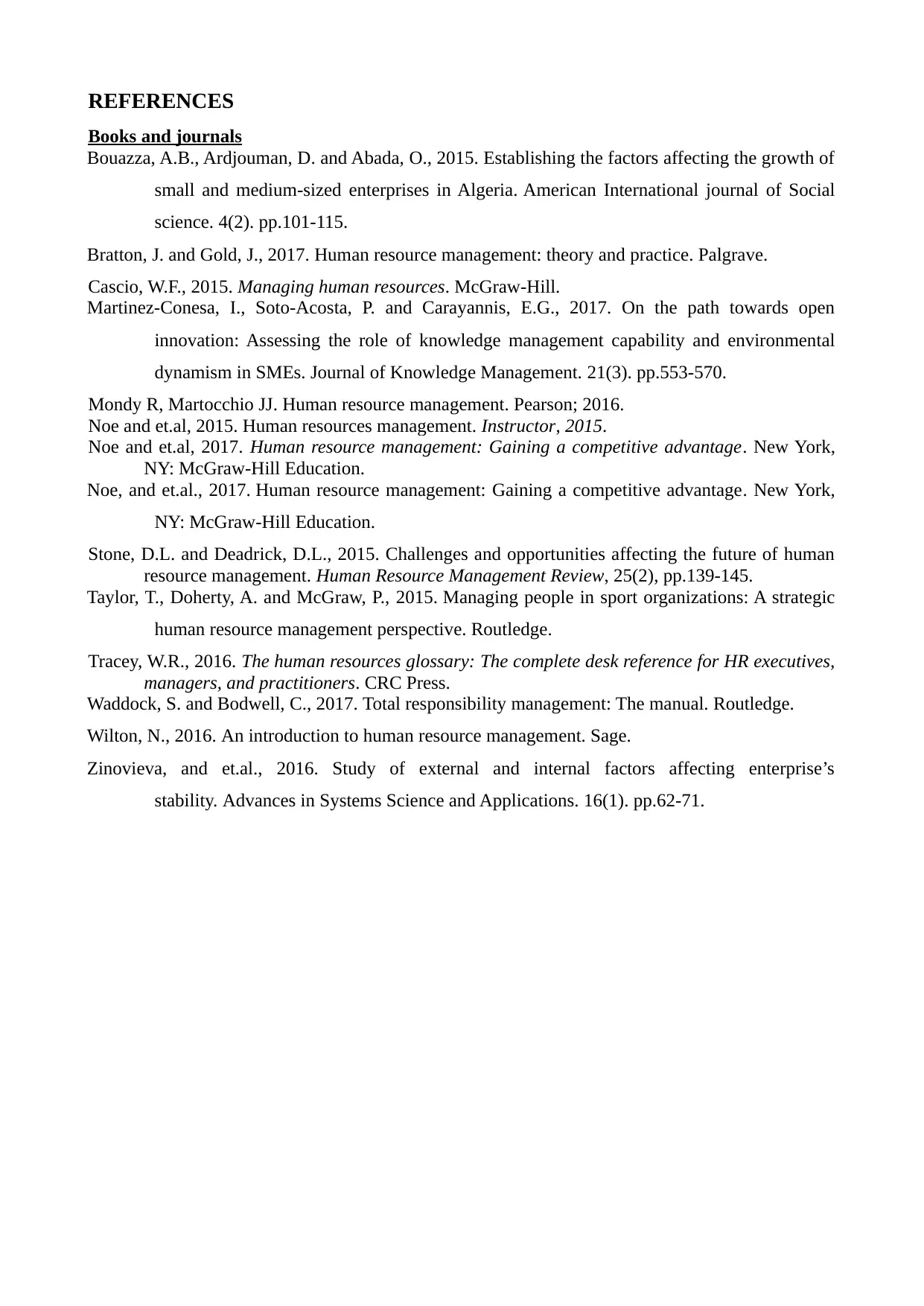
REFERENCES
Books and journals
Bouazza, A.B., Ardjouman, D. and Abada, O., 2015. Establishing the factors affecting the growth of
small and medium-sized enterprises in Algeria. American International journal of Social
science. 4(2). pp.101-115.
Bratton, J. and Gold, J., 2017. Human resource management: theory and practice. Palgrave.
Cascio, W.F., 2015. Managing human resources. McGraw-Hill.
Martinez-Conesa, I., Soto-Acosta, P. and Carayannis, E.G., 2017. On the path towards open
innovation: Assessing the role of knowledge management capability and environmental
dynamism in SMEs. Journal of Knowledge Management. 21(3). pp.553-570.
Mondy R, Martocchio JJ. Human resource management. Pearson; 2016.
Noe and et.al, 2015. Human resources management. Instructor, 2015.
Noe and et.al, 2017. Human resource management: Gaining a competitive advantage. New York,
NY: McGraw-Hill Education.
Noe, and et.al., 2017. Human resource management: Gaining a competitive advantage. New York,
NY: McGraw-Hill Education.
Stone, D.L. and Deadrick, D.L., 2015. Challenges and opportunities affecting the future of human
resource management. Human Resource Management Review, 25(2), pp.139-145.
Taylor, T., Doherty, A. and McGraw, P., 2015. Managing people in sport organizations: A strategic
human resource management perspective. Routledge.
Tracey, W.R., 2016. The human resources glossary: The complete desk reference for HR executives,
managers, and practitioners. CRC Press.
Waddock, S. and Bodwell, C., 2017. Total responsibility management: The manual. Routledge.
Wilton, N., 2016. An introduction to human resource management. Sage.
Zinovieva, and et.al., 2016. Study of external and internal factors affecting enterprise’s
stability. Advances in Systems Science and Applications. 16(1). pp.62-71.
Books and journals
Bouazza, A.B., Ardjouman, D. and Abada, O., 2015. Establishing the factors affecting the growth of
small and medium-sized enterprises in Algeria. American International journal of Social
science. 4(2). pp.101-115.
Bratton, J. and Gold, J., 2017. Human resource management: theory and practice. Palgrave.
Cascio, W.F., 2015. Managing human resources. McGraw-Hill.
Martinez-Conesa, I., Soto-Acosta, P. and Carayannis, E.G., 2017. On the path towards open
innovation: Assessing the role of knowledge management capability and environmental
dynamism in SMEs. Journal of Knowledge Management. 21(3). pp.553-570.
Mondy R, Martocchio JJ. Human resource management. Pearson; 2016.
Noe and et.al, 2015. Human resources management. Instructor, 2015.
Noe and et.al, 2017. Human resource management: Gaining a competitive advantage. New York,
NY: McGraw-Hill Education.
Noe, and et.al., 2017. Human resource management: Gaining a competitive advantage. New York,
NY: McGraw-Hill Education.
Stone, D.L. and Deadrick, D.L., 2015. Challenges and opportunities affecting the future of human
resource management. Human Resource Management Review, 25(2), pp.139-145.
Taylor, T., Doherty, A. and McGraw, P., 2015. Managing people in sport organizations: A strategic
human resource management perspective. Routledge.
Tracey, W.R., 2016. The human resources glossary: The complete desk reference for HR executives,
managers, and practitioners. CRC Press.
Waddock, S. and Bodwell, C., 2017. Total responsibility management: The manual. Routledge.
Wilton, N., 2016. An introduction to human resource management. Sage.
Zinovieva, and et.al., 2016. Study of external and internal factors affecting enterprise’s
stability. Advances in Systems Science and Applications. 16(1). pp.62-71.
1 out of 11
Related Documents
Your All-in-One AI-Powered Toolkit for Academic Success.
+13062052269
info@desklib.com
Available 24*7 on WhatsApp / Email
![[object Object]](/_next/static/media/star-bottom.7253800d.svg)
Unlock your academic potential
Copyright © 2020–2026 A2Z Services. All Rights Reserved. Developed and managed by ZUCOL.





